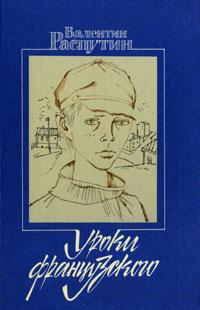The works of the author are always a kind of diary, which captures the innermost thoughts, experiences and events that happened to him in life. The story of Valentin Rasputin, which will be discussed, is more autobiogaphic than his other works. Let's see why. The story is called "French Lessons." It is based on a real story - as a teenager, a writer was forced to leave his house in order to continue his studies at the middle level of a comprehensive school: in his native village there was only a primary one. It is no coincidence that the story is conducted in the first person. Even the name of the teacher - Lidia Mikhailovna - is by no means fictitious.
Post-war childhood
The main character of the story “French Lessons”, just as once Valentin Rasputin, was in the city, settled with his aunt. It was 1948, a famine. Here, the boy had a very hard time, the meager supplies that his mother sent him from the village disappeared in a matter of days: one of the aunt kids got into the habit of carrying groceries. Often the hero had to be content with one boiling water. Even harder he was given separation from his family, and there was not a single person around who was ready to say a good word to the boy. The boy suffered from anemia, every day he needed at least a cup of milk. His mother sometimes sent him little money for this same milk, and the boy bought it at the bazaar. Once he decided to invest coins in a game called "chika", trained for a long time, and finally began to win. He needed only a ruble to buy milk, so the boy, having won it, left the game. The guys beat the cautious and successful player. This circumstance gave impetus to events that changed the thinking of the hero. And the reader begins to understand why the story is called "French Lessons."
Extraordinary teacher
Lidia Mikhailovna - a young beautiful woman hailing from the Kuban. Hero, she seemed a celestial. Everything in him admired and surprised him: the mysterious language that she taught, the odd smell of her perfume, gentleness, freedom and confidence. She was not at all like a teacher and seemed to be perplexed: why was she here?
Human participation

Lidia Mikhailovna quickly and carefully examined each student to make sure that everything was in order with the children. No wonder that she immediately noticed bruises and abrasions on the boy's face. Upon learning that he was playing for money, she did not drag the boy to the director, as was customary, but decided to talk heart to heart with him. Hearing that the child does not buy candy, but milk, she thought. The conversation ended with the boy promising not to play for money anymore. But hunger forced him to again hunt in this way. He was beaten again. The teacher understood that the little boy was surviving as best she could. She really wanted to help him somehow. For classes, Lidia Mikhailovna began to invite the ward to her home, communicated with him in a friendly and sympathetic manner, and tried to feed him. But the timid and proud boy could not be seated at the dining table. Then the teacher left a parcel with groceries in the name of the boy at school, as if from her mother. It had pasta, sugar and hematogen. An outlandish set betrayed the benefactress with her head: the boy guessed who the package was from, and flatly refused to take it. Wanting to make life easier for the child, Lidia Mikhailovna goes on a pedagogical “crime”: she plays with the student in the “wall” for money, contriving to “cheat” not in her favor. This climax in the story makes the story of Rasputin very dramatic and humane.
French lessons
In parallel with these, marked by deep moral content, the relationship between teacher and student, French is being taught. The boy managed everything except pronunciation. But daily activities aroused his interest and ability to language. The purposeful hero overcame difficulties step by step. Gradually, instead of torture, language lessons became a pleasure for him. But, of course, this is not the only answer to the question of why the story “French Lessons” is called.
Science of kindness
Living compassion, mercy without formalism - this is what this amazing teacher enriched the inner world of the hero with. Formally, playing with a student for money is an immoral act, but when we understand why a young woman is doing this, it takes on a completely different spiritual meaning. Remembering the teacher, Rasputin wrote that there was some kind of special independence in her, which saved her from hypocrisy. She did not need to pronounce educational monologues about nobility, honesty and kindness. Just everything that she did, at ease and naturally became the best life lessons for her young wards.
In the author’s life, of course, there were other good teachers. But the childhood memory of a French teacher, who, along with the wisdom of a foreign dialect, revealed the subtleties not described in ethics textbooks, forever determined the writer's spiritual mindset. This is why the story is called French Lessons.
The players were caught by the director, Lydia Mikhailovna was fired, and she went to her home in the Kuban. And soon the boy received a parcel in which rosy Antonov apples lay under pasta.